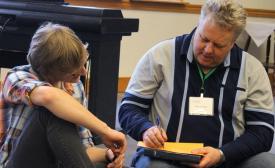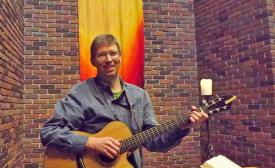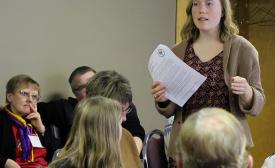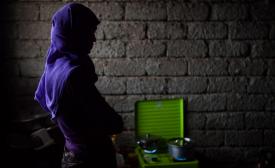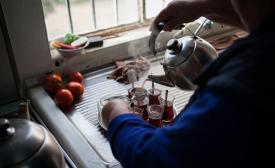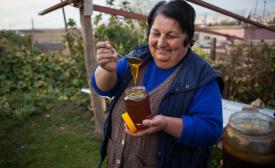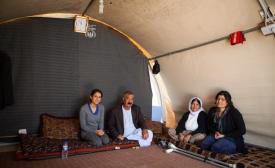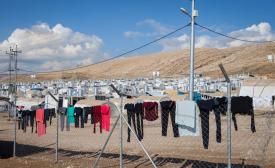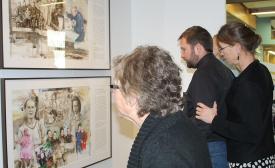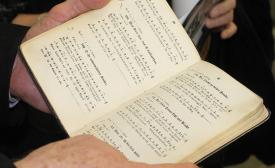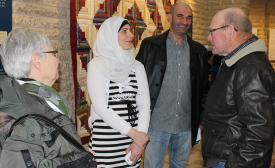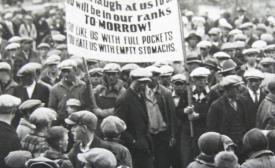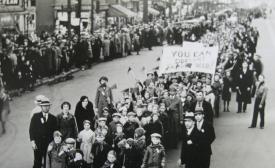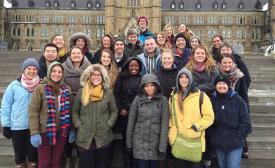Volume 20, Number 7
Can CM survive?
Perhaps the more pointed question should be: Do our readers and congregations of Mennonite Church Canada want us to survive?
Easter is past . . . where is Jesus now?
Excerpted and translated from a sermon preached at Niagara United Mennonite Church, Niagara-on-the-Lake, Ont., on April 26, 2015. It is based on chapter 21 of the Gospel of John, the well-known story of the disciples back in Galilee shortly after Easter.
Readers write: March 28, 2016 issue
Strange, suspect voices
One of the things I most admire about Scripture is the space it creates for the undominant voice, specifically the strange and suspect voice. For sure, the text is far from perfect. Alongside all those male authors, heroes and stories, give us some more women! And next to those Israelite colonists, how about a few Canaanites—those dispossessed natives—offering their truths?
Gently lead the mother sheep
“What this is about,” the counsellor said kindly, “is the end. How your mother faces the end—her dying—impacts everyone else in the family. How you and your siblings respond to your mother affects each person as well. You are all in this together.”
It’s time we had ‘the talk’
It’s time for “the talk.” You know, the one we’ve been putting off because it’s uncomfortable. That end-of-life conversation. There is, after all, a 100 percent certainty of our death. The Psalms remind us of our frailty: “Show me, Lord, my life’s end and the number of my days; let me know how fleeting my life is” Psalm 39:4 (New International Version).
Montreal River memories
‘Braun, Harder, Andres with wives at Montreal River,’ read the caption on the back of this photo taken by conscientious objector Wes Brown in 1942. As luck would have it, I knew Ted and Mary Harder, the centre couple, who were my great-uncle and great-aunt. E-mails to relatives confirmed the couple at left as Mary and Henry Braun. But who were the Andreses?
The pursuit of truth (Pt. 3)
The way many Canadians understand and talk about truth has changed. Some Christian thinkers believe the church needs to change how we understand and talk about truth as well, if we are to engage our fellow Canadians in meaningful conversations about God and faith.
Readers want CM to remain a print publication
Canadian Mennonite thanks everyone who took the time to fill out the reader survey distributed late in 2015. The responses were positive overall and showed that the magazine is generally well liked. Readers clearly prefer to read print, rather than online, and there is great resistance to the idea of making the magazine digital-only.
Bound to disagree, freed to love
Conflict within, uncertainties without. Perhaps it was because of these that planners of Mennonite Church Saskatchewan’s annual delegate sessions chose “Bound together, freed to serve” as their theme for the March 11 and 12, 2016, event.
Chains encircling a Bible provided a visual reminder of that theme as three speakers shared thoughts on Ephesians 4.
Alberta youth enjoy snow camps
Despite a warm winter, there was enough of the white stuff for youth from Mennonite churches across Alberta to call their annual winter retreats “snow camps.”
The Bible says what?
In her opening address to this year’s Pastors Week event at Anabaptist Mennonite Biblical Seminary, held during the last week of January 2016, Jewel Gingerich Longenecker, the school’s dean of lifelong learning, highlighted widespread confusion in the church today about what to do with the Bible, but implored listeners not to “put the Bible on the shelf.”
Do young people care about the future of the church?
Never let it be said that young people don’t care about the future of the church.
Late last year, Katrina Woelk, a sociology student at Canadian Mennonite University (CMU) and a member of the student council, was having a conversation with some other students and members of the university administration about the challenges facing Mennonite Church Canada.
A hope for home
For the most part, Syrians forced from their homes dream not of going to Europe or Canada, but of going back home. “They are in love with their country,” say Mennonite Central Committee (MCC) representatives for Lebanon and Syria, who cannot be named for security reasons.
Who is matching whose funds?
The federal government sometimes “matches” donations made by Canadians for specific causes. Does this mean that if you give $100 to MCC for Syria, Ottawa gives another $100 to MCC, and thus you can credit yourself with $200 going to Syria? In short, no on both counts.
A Red Sea kind of life
Scott Eyre, residence director of Cedarwood Hall at Eastern Mennonite University (EMU), sports photographer for the Royals, and soon-to-be-graduate, says the journey to the present day has included “a lot of Red Sea parting stuff.” Despite a circuitous route through one hardship after another, the waters have repeatedly parted, and Eyre has not walked through them alone.
Celebrating the resilience of Mennonite women
There are courageous women around every corner, especially at the Diefenbaker Canada Centre in Saskatoon, where the 26 paintings of Ray Dirks’s Along the Road to Freedom exhibit are currently on display.
Researching the past to understand the present
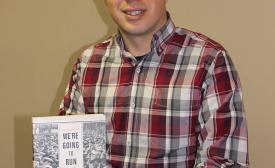
Stefan Epp-Koop is the author of We're Going to Run This City: Winnipeg's Political Left after the General Strike. (Photo by Aaron Epp)
“Why couldn’t I have been more interested in Caribbean history?”
That’s what historian Stefan Epp-Koop asked himself during a December 2007 visit to Winnipeg, as he trudged through a deep layer of fresh snow in -30 C weather to the City of Winnipeg Archives.
Welcoming the vulnerable
From Feb. 18-20, I was part of a group of 30 students and Mennonite Central Committee (MCC) staff from across Canada who met in Ottawa for the annual MCC Student Seminar to learn about refugees, asylum seekers and displaced persons. We heard from United Nations staff, MPs, MCC staff who work with refugees, and volunteers who assist newcomers to Canada.




